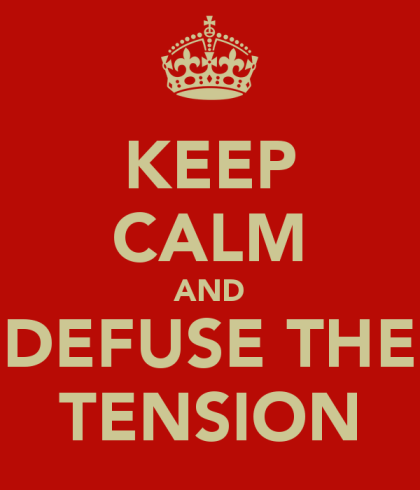To defuse or diffuse a situation?: 20 words not to confuse (19-20)
[19-20 of 20 words good writers shouldn���t confuse]
Poll results as of 29 December:
Leave as is=7
Change to defuse=41
Consult writer=8
Use another verb=7
Wouldn’t notice it as issue=2
What���s the issue?
In a sentence such as
She is coping because she has learned that forgiveness is the only way to diffuse ire and hatred
Birmingham Evening Mail, 2007
is diffuse a mistake for defuse?
Most dictionaries do not accept this use of diffuse, but Cobuild does, presumably, as an impeccably corpus-based venture, after having examined the evidence of actual use.
The Online Oxford Dictionary has a usage note (discussed later on); and the Cambridge Guide to Modern English Usage considers that when it comes to emotions (for example, as in the sample sentence above), the two distinct verbs overlap and converge.
(If you enjoy this blog, and find it useful, there’s an easy way for you to find out when I blog again. Just sign up (in the right-hand column) and you’ll receive an email to tell you. “Simples!”, as the meerkats say. I shall be blogging regularly about issues of English usage, word histories, and writing tips. Enjoy!)
What does each word ���mean���?
defuse: literally
In its literal meaning (sort of obviously, because it consists of the prefix de- + fuse (noun)), defuse means ���to remove the fuse of an explosive device in order to prevent it from exploding���:
Explosives specialists tried to defuse the grenade;
The device was defused by police bomb disposal experts.
…and metaphorically
in its literal sense, according to the OED, it’s a relative newcomer (1943). As a metaphor (1958), it refers to making a situation less dangerous or volatile. In other words, a situation is conceived of as something explosive, like a bomb. Things that people typically defuse (noun objects of the verb) are situation(s), crisis/crises, tension(s), anger, conflict(s), row(s):
With a joke and a smile he was able to defuse many a tense situation and his presence in any room was unmistakable;
Now he is trying to defuse the crisis that the warmongers have created;
Their diplomacy has been aimed at defusing conflict between the North and the South [sc. Korea].
But defuse has a near-homophone. It is, of course, the verb diffuse. The only thing that distinguishes it from defuse in speech is that its first vowel is a short i /d����fju��z/ contrasting with the long i of /di:��fju��z/, rhyming with tea.
Are they synonyms?
In their core meanings, it seems hard to argue that they are.
diffuse: core meanings
Simplifying its meanings considerably (I hope you���ll allow the unattached participle), if something diffuses, it spreads, and if you diffuse it, you spread it, e.g. information diffuses and you can diffuse it.
(Because the subject of the intransitive use can be the object of the transitive, it falls into the class of verbs classified as ergative. The fullest explanation of the verb���s syntax is in the Cobuild Dictionary).
What diffuses / is diffused can be abstract or concrete, and in the latter case it has a specific physical meaning when light is involved: “to cause light��to spread evenly��to reduce glare��and harsh��shadows”, e.g. The morning light was diffused to a mucky orange by the pollution of the shuddering city.
Further examples
(From Cobuild and the Online Oxford Dictionary)
Intransitive
His heart sank, fear spread and diffused through his body;
Technologies diffuse rapidly.
Transitive
The problem is how to diffuse power without creating anarchy;
an attempt to diffuse new ideas;
It works efficiently to create and diffuse purchasing power throughout the economy and disseminate liquidity throughout the financial system.
Where is the overlap?
One quite often comes across sentences using diffuse with nouns which seem more appropriate to defuse, both in its literal���bomb, explosive���and metaphorical meanings���crisis, situation, tension, anger, conflict. Are these mistakes, or legitimate extensions of meaning and collocation?
It is a moot point.  Cobuild recognizes it, but Collins, Macquarie and Merriam-Webster do not. Nor is it to be found in most dictionaries for learners of English, such as Cambridge, Macmillan, and the Oxford Advanced Learner���s. This suggests to me the possibility that, whereas the Cobuild editors acknowledged the weight of usage that is tending to legitimize what many people would still consider a mistake, the editors of dictionaries for learners prefer to discourage students from muddling up the two words. (It is also worth pointing out, incidentally, that the WordPress spellchecker flags diffuse ire and diffuse tension in this blog, and asks if I meant defuse.)
Cobuild recognizes it, but Collins, Macquarie and Merriam-Webster do not. Nor is it to be found in most dictionaries for learners of English, such as Cambridge, Macmillan, and the Oxford Advanced Learner���s. This suggests to me the possibility that, whereas the Cobuild editors acknowledged the weight of usage that is tending to legitimize what many people would still consider a mistake, the editors of dictionaries for learners prefer to discourage students from muddling up the two words. (It is also worth pointing out, incidentally, that the WordPress spellchecker flags diffuse ire and diffuse tension in this blog, and asks if I meant defuse.)
diffuse=defuse? Definition
Cobuild defines the contentious use of diffuse as follows:
“To diffuse a feeling, especially an undesirable one, means to cause it to weaken and lose its power to affect people”: The arrival of letters from the Pope did nothing to diffuse the tension.
The Oxford Online Dictionary does not include the meaning in its definition of diffuse;��instead it has a usage note:
“Diffuse means, broadly, ���disperse���, while the non-literal meaning of defuse is ���reduce the danger or tension in���. Thus sentences such as Cooper successfully diffused the situation are regarded as incorrect, while Cooper successfully defused the situation would be correct. However, such uses of diffuse are widespread, and can make sense: the image in, for example, “only peaceful dialogue between the two countries could diffuse tension” is not of making a bomb safe but of reducing something dangerous to particles and dispersing them harmlessly.
In two minds?
I find myself considerably (if one can be, linguistically speaking) in (or of, in the US) two minds. On the one hand, since this form is especially common in newspapers and transcripts, I suspect that urgent deadlines are often responsible, not to mention a certain amount of journalistic sloppiness. If I���m being over-literal, to my mind diffuse = “to spread”, and therefore diffusing tension spreads it rather than dissipating it.
A legitimate extension of meaning?
However, “spreading” is not the only meaning of to diffuse, and it is here that its physical meaning of “dispersing” light comes into play. Light that is diffused is made softer and less intense,��so I suppose that diffusing ��tension disperses it and thereby renders it less potent. I follow the logic of the Oxford editor’s argument, even though it still reads like special pleading to this old fuddy-duddy��(what a wonderful word that is!).
It also worth noting that both Cobuild and the Oxford note reproduced above have the same noun object collocate: tension.
So, I can see that there may well be a shift in collocational primings going on. In other words, more and more people are psychologically primed by their experience of the word diffuse to associate it with the semantic set of tension, crisis, etc, and to associate that set withdiffuse rather than defuse.
However, that collocational shift still raises problems for me. If diffuse is “correct” when used metaphorically, and in specific collocations, e.g. tension / row / controversy / crisis, why would it not be “correct” ��when applied literally (i.e. ?he diffused the device). But, even though diffuse turns up several times��with��bomb��and words in that set, it still feels completely wrong, at least to me.
Conclusions
There seem to me to be three ways of looking at this issue in “correct usage” terms:
At the strict, i.e. “prescriptive”, end of the spectrum, the only correct verb for the contexts discussed above is defuse.
At the other, i.e. “descriptive”,��end, one could take the view that diffuse is correct in all collocations that match those of defuse, i.e. including its literal use with bombs, etc. Though that use��must, surely, have started out as a homophone mistake, we accept that it is now part of standard usage, and therefore applicable in all circumstances.
We adopt a sort of Buddhist “middle way” approach and say that the two words are synonyms in some contexts, but not in others. Thus diffuse tension would be correct, but diffuse a bomb would not. There is nothing linguistically perverse about this, since synonymy operates with meanings, not words, and therefore works with some collocates but not others: a tax bill can be large or hefty, a building can only be large. However, this “middle way” would probably lead to a lot of borderline cases.
Further examples, facts & figures
In the OEC, these two lemmas do not differ much in frequency: they occur just over twice in every million words of text (compared to, say, “big”, which occurs nearly 400 times per million).
Their collocations overlap very little: apart from noun objects, as shown below, the adverb quickly and the verbs try and attempt.
There are eight noun objects with which they both collocate. They are listed in descending order, according to the ratio of occurrences of defuse to diffuse: situation, anger, confrontation, standoff, tension, row, crisis, bomb. The ratios range from just under 3:1 for situation to nearly 12:1 for bomb. In other words, for the most literal meaning, diffuse encroaches far less on defuse than it does with less literal meanings.
In absolute rank order as collocates of diffuse, the above nouns are: situation, tension, crisis, bomb, anger, row, confrontation, standoff.
Nevertheless, the dispute over the islands will continue to cause political and economic headaches for China and Japan, with neither acting to defuse the tensions���Business Insider, 2013;
Yet the frenzied days and sleepless nights seem to have averted a major embarrassment for the administration and defused a crisis that threatened to upend relations between the two countries���NYT, 2012;
The Scott report is a time-bomb stealthy politicians and officials are trying to diffuse���Guardian, 1995;
Meanwhile, the European Union is trying to diffuse the controversy by calling for a voluntary media code of conduct.���CNN transcripts, 2006.
Filed under: Advice for writers, Confusable words, Dictionaries & Lexicography, Grammar, Meaning of words, Writing Skills Tagged: 20 confusable words







